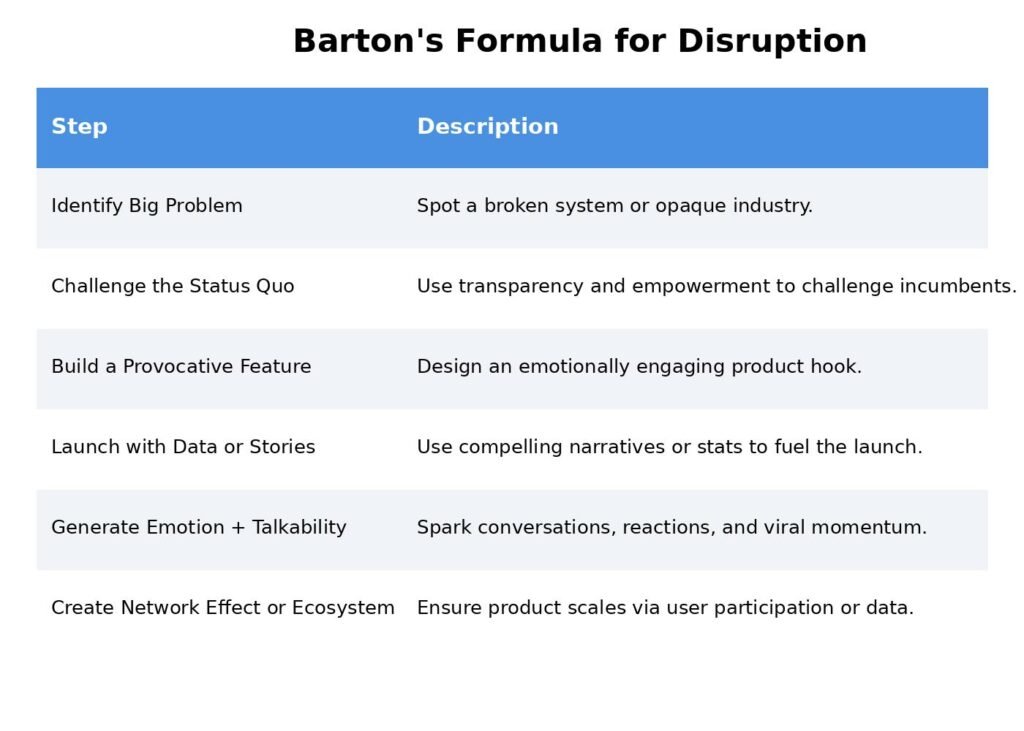From Expedia to Zillow: Building Billion-Dollar Brands with Bold Ideas and Provocation Marketing
The Tim Ferriss Show with Rich Barton | July 10, 2025
Rich Barton is no ordinary entrepreneur. He’s the mind behind Expedia, Zillow, Glassdoor, and more—a true serial innovator with a knack for transforming opaque industries through the power of data, transparency, and user empowerment. His philosophy is simple but powerful: “Power to the people.” He believes that unlocking hidden information and delivering it directly to consumers creates not only impact—but enduring businesses.
In this post, we dive deep into Barton’s entrepreneurial journey, his belief in taking big swings, and how he used provocation marketing to build some of the most recognized digital brands in the U.S. today. Along the way, we’ll extract real-life tips for entrepreneurs, startup teams, and marketers looking to follow in his footsteps.

The Early Days: From Stanford to Microsoft
Barton began his career in classic overachiever fashion: Stanford engineering, strategy consulting, and then on to Microsoft in 1991. At the time, Microsoft was a company of about 3,000 employees. Barton cut his teeth working under legendary product managers, including Brad Chase. His first major assignment? Packaging and distributing MS-DOS 5—software that would break the infamous 640K memory barrier.
While at Microsoft, Barton learned an essential lesson early on:
“Great organizations encourage innovation and do not punish failure.”
One of his first big product ideas—a bundled book/software package with DOS for Dummies—flopped. But instead of being reprimanded, Chase asked: “What’s your next big idea?” This would become a foundational experience for Barton’s risk-embracing leadership style.
Real-life tip: If you’re in a leadership role, remember that how you handle failure defines your team’s willingness to innovate. When someone on your team fails big, don’t penalize them—ask them what they learned and what they’ll try next. Psychological safety is what separates good companies from great ones.
Taking Big Swings: The Birth of Expedia
The story of Expedia is a classic tale of intrapreneurship. Barton pitched the idea of an online travel booking platform to Bill Gates during his time in Microsoft’s consumer division. Gates was intrigued—not just by the consumer angle, but because it would allow Microsoft to rebuild travel mainframes using Windows NT.
Here’s the kicker: Expedia was born out of a marriage compromise. Barton’s wife, Sarah, was applying to medical residencies. With limited chances she’d match in Seattle, Barton needed an exit plan. He pitched the idea as a spinout, believing he’d leave Microsoft. Instead, Gates said, “Do it here.” And thus, Expedia was incubated inside Microsoft before spinning out and going public in 1999.
Barton secured funding, built a product, and later raised over $100 million to make Expedia a household name. In doing so, he made travel booking radically more accessible.
IPO Day Meets Delivery Room
The night before Expedia’s IPO, Sarah went into labor.
“She said, ‘If our baby is born on IPO day, do I really have to name him Expedia?”
They didn’t, but that moment—a son born as Barton’s company hit the stock market—remains one of his most profound memories.
Lesson: Sometimes life and business collide in extraordinary ways. Barton’s story teaches us that entrepreneurship isn’t just about business—it’s also deeply personal. Great entrepreneurs manage both, and embrace the messy, beautiful overlaps.
From Roadshows to Reinvention: Florence, Italy
After selling Expedia to Barry Diller’s IAC, Barton took a rare sabbatical. He moved his family to Florence, Italy, enrolled in painting and Italian classes, rode bikes, and absorbed culture. The break didn’t last long. His co-founder from Expedia, Lloyd Frink, had just been fired. He convinced Barton to stay in Seattle and brainstorm new ideas. One of those ideas would become Zillow.
The Italian interlude wasn’t a pause; it was a perspective shift. Barton learned that creativity thrives in environments of beauty, calm, and open time. He realized he wasn’t ready to stop building—he just needed space to think. Real-life takeaway? Don’t underestimate the value of stepping away. If you’re stuck or burned out, a sabbatical, even a mini one, can reboot your brain and rewire your curiosity.
While many fear gaps in their résumé, Barton’s time in Florence fueled what would become one of his most revolutionary ventures.
Tip: Take breaks seriously. Use them to zoom out. Think about the systems and industries you interact with daily. Ask: What still feels broken? What could be better with software? Then, go build that.
Disrupting Real Estate: The Origin of Zillow
The U.S. real estate market in 2005 was shrouded in secrecy. You couldn’t easily find home prices online. Barton and Frink saw the same problem they solved with Expedia: a gatekept industry, ripe for disruption through transparency and software.
Their first attempt was to build an online home auction site. It failed. But in the process, they created a tool to estimate the value of every home in America. This tool, the Zestimate, became their killer feature.
“We knew the Zestimate was candy—data consumers desperately wanted.”
They launched with this feature at the center. It caused outrage among agents, fascination among homeowners, and an avalanche of free press.
Tip: If your first product idea flops, don’t panic. Look at what worked inside the failure. Barton turned a failing auction site into a market-defining product by recognizing one sticky, addictive feature: price estimation.
Another tip? Listen to your own pain points. Barton was house hunting and frustrated by the process. That firsthand problem-solving instinct has fueled every company he’s created.
The Power Of Provocative Features
Feature
| Industry Impact
| Consumer Reaction
|
Zestimate
| Disrupted realtor gatekeeping
| Addictive, viral
|
Glassdoor Reviews
| Unmasked employer culture
| Empowering, controversial
|
Expedia Pricing
| Replaced travel agents
| Transparent, convenient
|
These features had something in common: they pulled back the curtain. Consumers didn’t just get access—they got power. The market shifted from middlemen to marketplaces.
Lesson: If you’re designing product features, ask yourself: What secrets are still hidden from users? Then, design with courage. Release something that’s emotionally resonant—even polarizing. You’ll know you’ve hit the mark if people either love it… or want to shut it down.
Provocation Marketing: Controversy Creates Conversation
Barton is a master of what he calls provocation marketing. The idea? Use product features that spark emotion—curiosity, shock, or excitement—and then let your customers do the marketing for you.
At Zillow, this meant:
- Making Zestimate data public
- Mapping home prices over Google Maps
- Letting users stalk old houses, ex-boyfriends’ homes, or dream mansions
The result? Massive viral word of mouth. Local news outlets picked up on housing trends. Data feeds were built for every zip code.
At Glassdoor, it was salary transparency. Their model? You could only see salary data if you shared your own. Barton called it:
“You show me yours, I’ll show you mine.”
This reciprocity helped the platform scale rapidly. And yes, lawsuits followed—but they were part of the plan.
“We knew we’d get sued. We planned for it. Lawsuits created more headlines.”
Practical Tip: If your product elicits a “can they do that?” reaction, lean in. Design the press cycle to follow the outrage. Have your legal bases covered, and let the conversation elevate your brand.
Startups like Uber and Airbnb used the same formula. Disruption almost always involves friction—but friction sparks fire.

Each of Barton’s companies follows this blueprint—from Zillow to Expedia to Glassdoor. Start with a broken system. Build something bold. Use controversy to amplify reach.
Lesson: Entrepreneurs should print this framework and hang it over their desks. It’s a step-by-step map for creating category-defining products. If you’re stuck in the weeds, walk through each node. Ask: Where am I weak? What’s not provoking emotion yet? Tweak until it does.
Lessons from Barton’s Playbook
- Hire Intrapreneurs & Protect Them
“Corporate culture rejects foreign bodies. Leadership must protect innovators.”
Innovators often don’t fit. They question authority, break process, and look weird on org charts. But Barton believes they’re vital. That’s why his leadership style involves finding, nurturing, and shielding them.
Tip: If you’re a founder, resist the urge to homogenize your team. You need the misfits. They’ll see angles no one else does. Put them in positions to create, not just execute.
- Don’t Be Afraid to Be Sued
Whether with Avvo, a lawyer-rating site, or Glassdoor, Barton knew that provoking entrenched players leads to resistance. His approach? Stay legally sound, expect lawsuits, and use them to boost PR.
Tip: Build legal durability into your business model early. Lawsuits don’t have to be scary if you’re prepared—and they can drive customer awareness like nothing else.
- Build Brands, Not Just Products
Barton doesn’t just create functional websites—he builds brands that resonate emotionally. Zillow means curiosity. Glassdoor means honesty. Expedia means freedom.
Tip: Your name, design, tone, and data should tell a story. Don’t just be useful—be unforgettable.
- Customer Obsession Wins
The end goal of all his companies is to give users the power. Whether it’s buying travel, searching salaries, or checking home values—transparency and control always win.
Tip: Ask yourself, “If I were the customer, what would I want to know that no one is telling me?” Then build that. You’ll win loyalty for life.
Beyond the Startup: Life, Routine, and Perspective
Barton isn’t all business. His morning routine involves:
- A custom smoothie (oat milk, blueberries, electrolyte drink, and a single prune)
- Watching CNBC on mute while scanning emails
- Using a heated massage belt called the Hyperice Venom
- Morning workouts to clear his head
He also shares a touching family tradition: as the short-order chef for his kids, he made anything they wanted for breakfast—capturing candid photos each morning in a folder titled The Breakfast Club. These moments, he says, are among his most valuable memories.
“It’s a virtual possession, but my most prized one.”
Life lesson: Legacy isn’t just business success—it’s the small daily rituals that make life rich. Make time for those. Build systems that honor both your ambitions and your relationships.
Final Thoughts: Why Rich Barton’s Philosophy Works
At the heart of Barton’s approach is a deep respect for the consumer—an urge to decentralize access to power, information, and wealth.
His companies thrive because they solve real problems and do so in a way that feels modern, simple, and emotionally resonant. He doesn’t wait for permission. He creates categories, challenges outdated norms, and isn’t afraid of a little backlash.
If you’re building something today, take a page from Rich Barton’s playbook:
- Find a broken system
- Build a provocative solution
- Speak to the consumer’s emotional needs
- Ignore the gatekeepers
- And most importantly—believe in the power of bold, audacious ideas
Related Post





